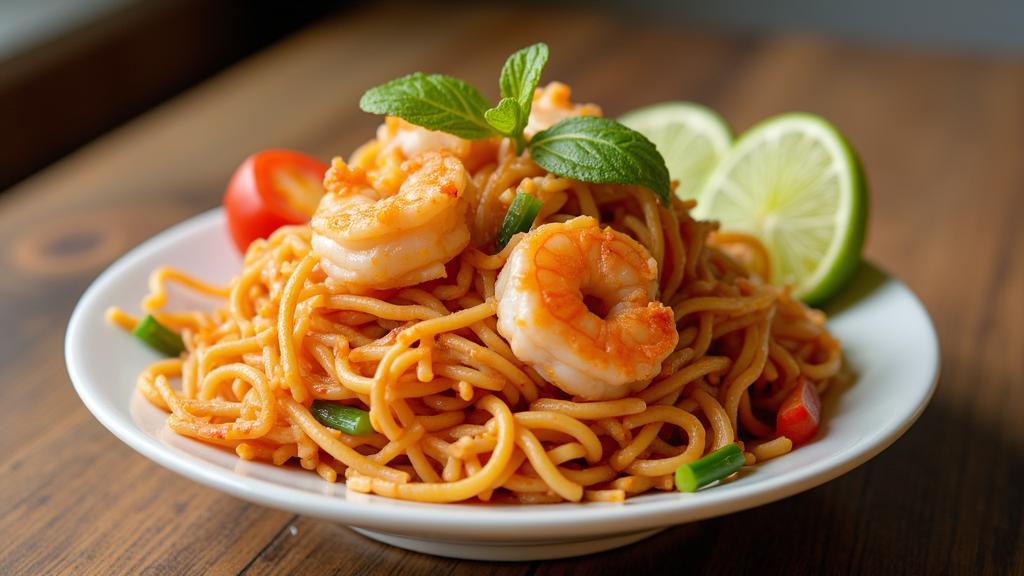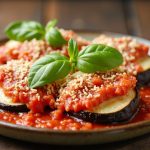Introduction
Ready to bring the vibrant flavors of Thailand right to your kitchen? This Shrimp Pad Thai recipe delivers all the authentic taste you’re craving, with perfectly cooked shrimp, chewy rice noodles, and that irresistible sweet-savory sauce that makes this dish a global favorite. I’ve simplified this restaurant favorite without compromising on taste, making it accessible for home cooks of all skill levels. Whether you’re a Thai food enthusiast or trying your hand at Asian cuisine for the first time, this recipe will help you create a restaurant-quality Pad Thai that’s sure to impress.
Ingredients
- 8 oz flat rice noodles
- 1 lb medium shrimp, peeled and deveined
- 3 cloves garlic, minced
- 2 eggs
- 1 cup bean sprouts
- 1/2 cup chopped peanuts
- 3 green onions, chopped
- 1/4 cup fresh cilantro
- Lime wedges for serving
- For the sauce:
- 3 tablespoons fish sauce
- 3 tablespoons brown sugar
- 2 tablespoons tamarind paste
- 1 tablespoon rice vinegar
- 1 teaspoon sriracha (optional)
Instructions
- Soak the rice noodles in warm water for 30 minutes until they’re pliable but still firm. Drain and set aside.
- While the noodles soak, whisk together all sauce ingredients in a small bowl until the sugar dissolves completely.
- Heat 2 tablespoons of oil in a large wok or skillet over medium-high heat. Add shrimp and cook until just pink, about 2-3 minutes. Remove and set aside.
- In the same pan, add garlic and stir-fry for 30 seconds until fragrant.
- Push everything to one side of the pan and crack the eggs into the empty space. Scramble them quickly until just set.
- Add the drained noodles and sauce. Toss everything together, continuing to cook for 2-3 minutes until the noodles are tender.
- Return the shrimp to the pan, add bean sprouts and half the peanuts. Toss to combine.
- Serve hot, topped with remaining peanuts, green onions, cilantro, and lime wedges.
Cook Time and Serving Size
Prep Time: 40 minutes (including noodle soaking time)
Cook Time: 15 minutes
Total Time: 55 minutes
Servings: 4
Recipe Notes
- Can’t find tamarind paste? Mix equal parts lime juice and brown sugar as a substitute.
- Don’t skip the noodle soaking step – proper noodle texture is crucial for authentic Pad Thai.
- Keep ingredients prepped and ready before starting to cook, as this dish comes together quickly.
- Adjust the heat level by varying the amount of sriracha or adding extra chili flakes.
- For the best texture, don’t overcook the noodles – they should maintain a slight chewiness.
- Store leftovers in an airtight container for up to 2 days, though this dish is best enjoyed fresh.

Shrimp Pad Thai
This Shrimp Pad Thai recipe delivers all the authentic taste you're craving, with perfectly cooked shrimp, chewy rice noodles, and that irresistible sweet-savory sauce that makes this dish a global favorite.
Ingredients
- 8 oz flat rice noodles
- 1 lb medium shrimp peeled and deveined
- 3 cloves garlic minced
- 2 eggs
- 1 cup bean sprouts
- 1/2 cup chopped peanuts
- 3 green onions chopped
- 1/4 cup fresh cilantro
- Lime wedges for serving
- 3 tablespoons fish sauce
- 3 tablespoons brown sugar
- 2 tablespoons tamarind paste
- 1 tablespoon rice vinegar
- 1 teaspoon sriracha optional
Instructions
- Soak the rice noodles in warm water for 30 minutes until they're pliable but still firm. Drain and set aside.
- While the noodles soak, whisk together all sauce ingredients in a small bowl until the sugar dissolves completely.
- Heat 2 tablespoons of oil in a large wok or skillet over medium-high heat. Add shrimp and cook until just pink, about 2-3 minutes. Remove and set aside.
- In the same pan, add garlic and stir-fry for 30 seconds until fragrant.
- Push everything to one side of the pan and crack the eggs into the empty space. Scramble them quickly until just set.
- Add the drained noodles and sauce. Toss everything together, continuing to cook for 2-3 minutes until the noodles are tender.
- Return the shrimp to the pan, add bean sprouts and half the peanuts. Toss to combine.
- Serve hot, topped with remaining peanuts, green onions, cilantro, and lime wedges.



